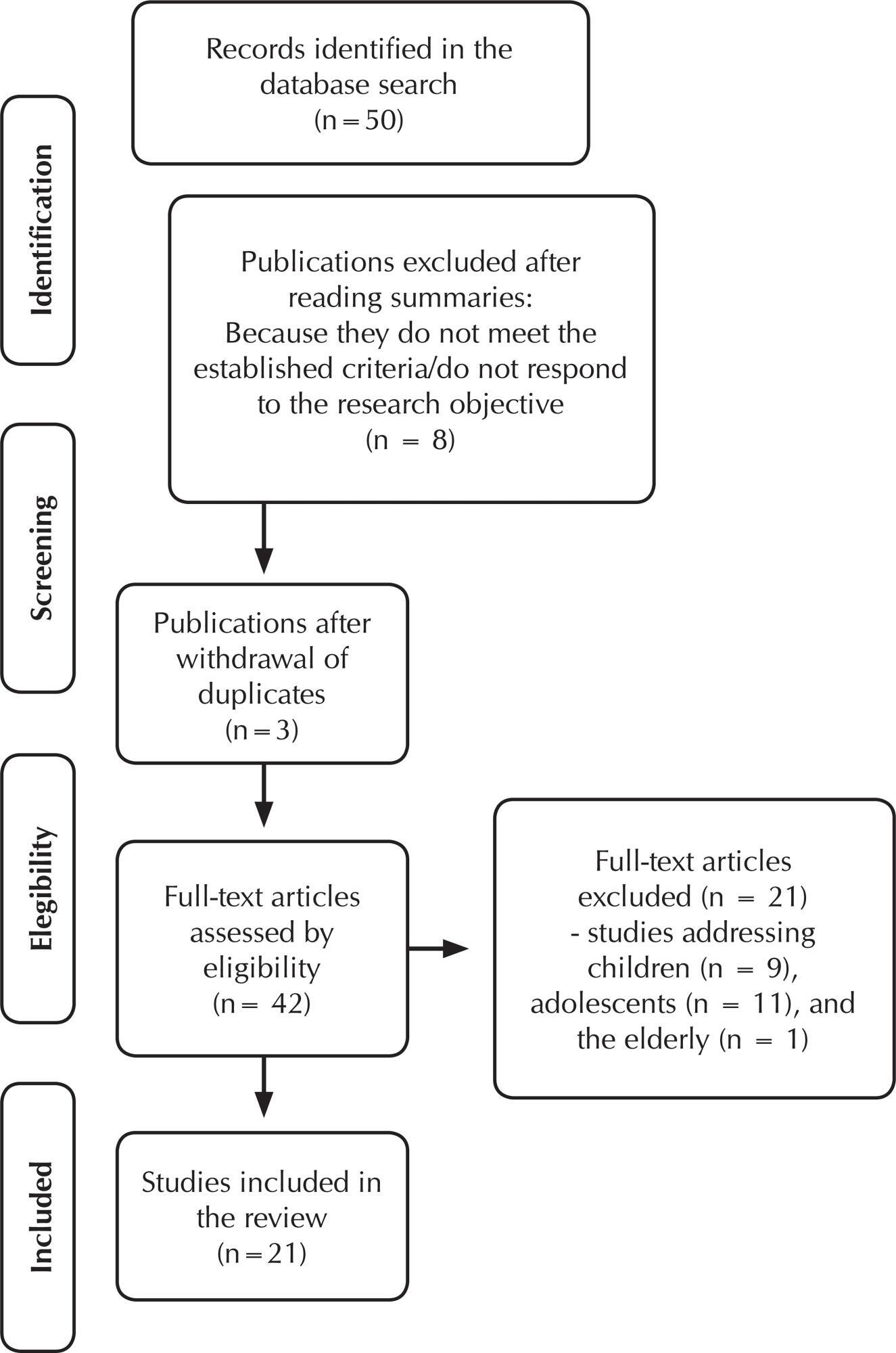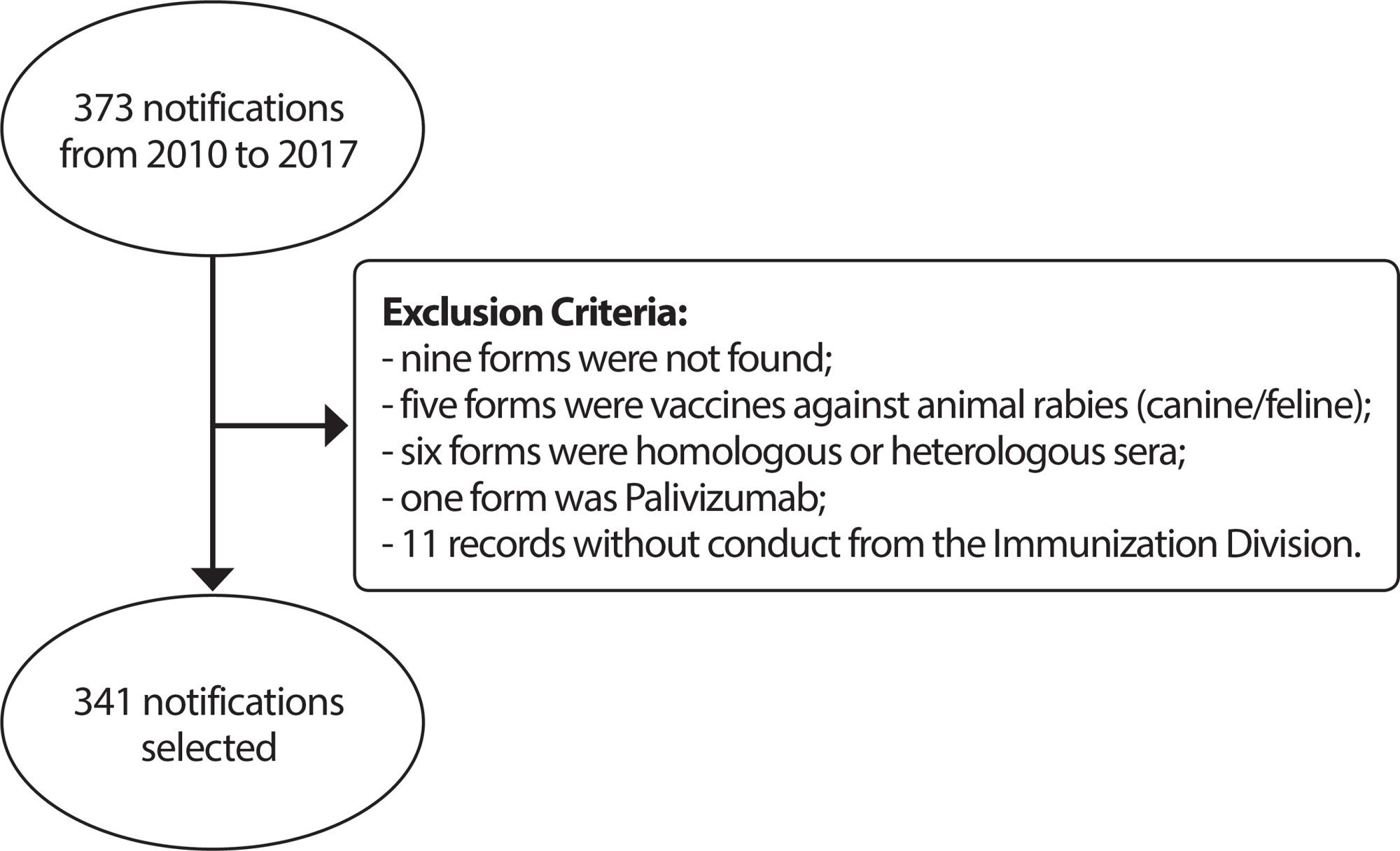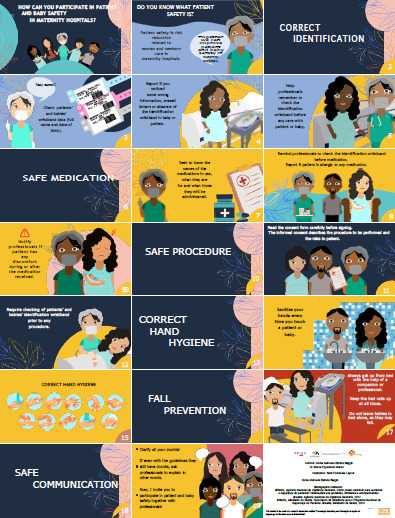-
REFLECTION01-01-2018
Health advocacy in nursing: contribution to the reorientation of the Brazilian healthcare model
Revista Brasileira de Enfermagem. 2018;71:700-703
Abstract
REFLECTIONHealth advocacy in nursing: contribution to the reorientation of the Brazilian healthcare model
Revista Brasileira de Enfermagem. 2018;71:700-703
DOI 10.1590/0034-7167-2017-0615
Views0See moreABSTRACT
Inequalities are the result of the different positions held by individuals in different social spaces, and are related to the distribution of power and property. Health advocacy is a strategy to reduce such inequalities, especially those considered unfair and unnecessary, aiming to fully promote the right to health. This study aims to discuss the contribution of nursing in the field of health advocacy, which includes the right of everyone to a healthy life as one of the strategies for the reorientation of the Brazilian healthcare model.
-
REVIEW01-01-2018
Coping strategies for domestic violence against pregnant female adolescents: integrative review
Revista Brasileira de Enfermagem. 2018;71:693-699
Abstract
REVIEWCoping strategies for domestic violence against pregnant female adolescents: integrative review
Revista Brasileira de Enfermagem. 2018;71:693-699
DOI 10.1590/0034-7167-2017-0682
Views0See moreABSTRACT
Objective:
To investigate and analyze in the scientific literature coping strategies for domestic violence against pregnant female adolescents.
Method:
This is an integrative literature review, conducted from July to August 2017 on LILACS, SciELO and PubMed, using the descriptors and the MeSH terms: confrontation, violence, adolescent, pregnant women, prenatal care.
Result:
The sample comprised 9 articles that were organized and characterized according to year, country of study and coping strategy used. The main forms of coping involved the active search for cases and the primary care approach with all family members.
Conclusion:
Individualized prenatal care, the change in professional training and networking activities were pointed out as important components of the strategies for coping with violence against pregnant adolescents.

-
REVIEW01-01-2018
People living on the street from the health point of view
Revista Brasileira de Enfermagem. 2018;71:684-692
Abstract
REVIEWPeople living on the street from the health point of view
Revista Brasileira de Enfermagem. 2018;71:684-692
DOI 10.1590/0034-7167-2017-0547
Views0See moreABSTRACT
Objective:
To know the Brazilian scientific production of the last ten years (2007 to 2016) about people who experience street situations under the health gaze.
Method:
Integrative literature review using the descriptors: street people, health policy and public health. We analyzed 21 articles available in the Virtual Health Library.
Results:
Four categories of analysis emerged. There was an increase in the frequency of published work on the subject, showing that the experience of living on the street makes people vulnerable to various diseases and health problems and, in addition, increases the difficulties of access to health services.
Conclusion:
There was an increase in the discussion of this topic due to the increase in the number of published studies. Despite the existence of public health policies directed to this social group, much still needs to be done to guarantee the health of this population.

-
RESEARCH01-01-2018
Epidemiological profile of maternal mortality
Revista Brasileira de Enfermagem. 2018;71:677-683
Abstract
RESEARCHEpidemiological profile of maternal mortality
Revista Brasileira de Enfermagem. 2018;71:677-683
DOI 10.1590/0034-7167-2017-0624
Views0See moreABSTRACT
Objective:
To know the epidemiological profile of maternal mortality in Juiz de Fora, a city in the state of Minas Gerais. Data collection was carried out from April to December 2016.
Method:
Summary of a confidential investigation of maternal mortality on deaths occurred from January 1st, 2005 to December 31, 2015.
Results:
Eighty-five deaths of women residing in Juiz de Fora were identified and analyzed. The age group was between 20 and 36 years. The women carried out prenatal care (74.1%) with less than six visits (34.0%). Cesarean section was conducted in 38.8% of the childbirths and the obstetric treatment was considered appropriate (32.9%). The first cause of maternal death was hypovolemic shock 12 (14.10%), followed by uterine hypotony 6 (7.0%).
Conclusion:
Cesarean section rates are high and prenatal adherence is lower than that expected, which could justify the number of deaths in the period studied.
-
RESEARCH01-01-2018
Permanent education in the vaccination room: what is the reality?
Revista Brasileira de Enfermagem. 2018;71:668-676
Abstract
RESEARCHPermanent education in the vaccination room: what is the reality?
Revista Brasileira de Enfermagem. 2018;71:668-676
DOI 10.1590/0034-7167-2017-0560
Views0See moreABSTRACT
Objective:
To understand, from the perspective of the professional, the Permanent Education (PE) in the vaccination room in its real context.
Method:
Multiple holistic-qualitative case studies, based on Maffesoli’s Interpretive Sociology with 56 participants from four microregions of the Western Extended Region of Minas Gerais State.
Results:
They present PE as infrequent and insufficient. They denote that the practical-theoretical experience with vaccine contributes to the work; the search for knowledge, starting from the professional itself; and the professional training fails to perform in the vaccination room.
Final considerations:
The notions of PE are linked to the daily needs of individuals and services, with indication of being interactive, periodic, in specific and non-global issues for better assimilation. Obstacles to the non-implementation of PEH are realized by the workload associated with insufficient human resources, the distance of the nurses from the vaccination room and the lack of support from the higher levels.
-
RESEARCH01-01-2018
Work and Leprosy: women in their pains, struggles and toils
Revista Brasileira de Enfermagem. 2018;71:660-667
Abstract
RESEARCHWork and Leprosy: women in their pains, struggles and toils
Revista Brasileira de Enfermagem. 2018;71:660-667
DOI 10.1590/0034-7167-2017-0598
Views0See moreABSTRACT
Objective:
To analyze the interference of leprosy in women’s life regarding work and daily life activities.
Method:
Exploratory qualitative study developed from semi-structured interviews and with the use of field diaries. The strategy of the organization of data was a thematic analysis of content and referential of the work process in health and gender.
Results:
The themes presented are: “The leprosy pains”, “Changes with the disease and adaptation at work and activities” and “Being a woman with leprosy”. On them, we present the aspects that changed in women’s life from the leprosy, especially regarding work and daily activities. Beyond physical limitation, there are impacts on social relations and above all on formal work, there may even be dismission.
Final considerations:
In women affected by leprosy, work and daily activities are directly affected; this deepens the social difficulties and requires attention of health professionals.
-
RESEARCH01-01-2018
Social networks of patients with chronic skin lesions: nursing care
Revista Brasileira de Enfermagem. 2018;71:652-659
Abstract
RESEARCHSocial networks of patients with chronic skin lesions: nursing care
Revista Brasileira de Enfermagem. 2018;71:652-659
DOI 10.1590/0034-7167-2017-0581
Views0See moreABSTRACT
Objective:
To describe the social networks of patients with chronic skin damages.
Method:
A qualitative study conducted through semi-structured interviews with nine subjects with chronic skin lesions from June 2016 to March 2017; we used the theoretical-methodological framework of Lia Sanicola’s Social Network.
Results:
The analysis of the relational maps revealed that the primary network was formed mainly by relatives and neighbors; its characteristics, such as: reduced size, low density and few exchanges/relationships, configures fragility in these links. The secondary network was essentially described by health services, and the nurse was cited as a linker in the therapeutic process.
Final considerations:
Faced with the fragility of the links and social isolation, the primary health care professionals are fundamental foundations for the construction of networks of social support and care for patients with chronic skin lesions.

-
RESEARCH01-01-2018
Factors associated with delay in seeking care by tuberculosis patients
Revista Brasileira de Enfermagem. 2018;71:646-651
Abstract
RESEARCHFactors associated with delay in seeking care by tuberculosis patients
Revista Brasileira de Enfermagem. 2018;71:646-651
DOI 10.1590/0034-7167-2016-0680
Views0See moreABSTRACT
Objective:
To identify social, clinical and behavioral factors of tuberculosis patients that are associated with delay in the search for primary health care.
Method:
This is a cross-sectional, quantitative study conducted with 56 people on treatment for pulmonary tuberculosis in the city of Natal, in the state of Rio Grande do Norte, Brazil. The data were collected through a structured instrument. The Chi-square and Fisher tests were applied to test the association between independent and dependent variables (search time). A value of p <0.05 was set as statistically significant.
Results:
No social or clinical variables were statistically associated with patient delays in the search for primary health care. Among the behavioral variables, self-medication and the first health service sought had a statistically significant association with the time for seeking care (p = 0.020, and p = 0.033, respectively).
Conclusion:
Self-medication contributes to the delay in the search for primary health care by tuberculosis patients.
-
06-01-2015
Health promotion in supplementary health care: outsourcing, microregulation and implications for care
Revista Brasileira de Enfermagem. 2015;68(3):482-489
Abstract
Health promotion in supplementary health care: outsourcing, microregulation and implications for care
Revista Brasileira de Enfermagem. 2015;68(3):482-489
DOI 10.1590/0034-7167.2015680315i
Views1See moreABSTRACT
Objective:
to analyze health promotion programs in the supplementary health care.
Methods:
This was a multiple case study with a qualitative approach whose data were obtained from interviews with coordinators of providers contracted by the corporations of health insurance plans in Belo Horizonte, Minas Gerais. The data were submitted to Critical Discourse Analysis.
Results:
Home care has been described as the main action in the fi eld of health promotion transferred to the providers, followed by management of patients and cases, and the health education.groups. The existence of health promotion principles is questionable in all programs. Outsourcing is marked by a process with a division between cost and care management. Implications of this process occur within admission and interventions on the needs of the benefi ciaries.
Conclusions:
Statements revealed rationalization of cost, restructuring of work, and reproduction of the dominant logic of capital accumulation by the health insurance companies.

-
ORIGINAL ARTICLE01-01-2019
Knowledge and behavior of professionals about bundled strategies of central venous catheter
Revista Brasileira de Enfermagem. 2019;72(1):50-56
Abstract
ORIGINAL ARTICLEKnowledge and behavior of professionals about bundled strategies of central venous catheter
Revista Brasileira de Enfermagem. 2019;72(1):50-56
DOI 10.1590/0034-7167-2018-0164
Views1See moreABSTRACT
Objective:
To investigate the factors that influence the knowledge and behavior of professionals of neonatal and pediatric units about bundled strategies of insertion of central venous catheter.
Method:
This is a cross-sectional study, conducted in one neonatal and one pediatric intensive care units in a public hospital in Belo Horizonte, Brazil, from April to July, 2016. The sample consisted of 255 professionals who answered a structured instrument. Descriptive and comparative analyses were made using the SPSS software.
Results:
The category nursing professional (p = 0.010), working hours of 12×36 scale (p < 0.001), training as a form of acquiring knowledge (p < 0.001) and participation in training programs (p < 0.001) are associated to greater knowledge about the bundle. Regarding behavior, no significant associations were observed.
Conclusion:
The study showed that there are factors that influence the knowledge about bundled strategies of insertion of central venous catheter, reflecting the need to consider these practices for making more effective educational practices in health care.
-
ORIGINAL ARTICLE12-13-2019
Factors associated with low Apgar in newborns in birth center
Revista Brasileira de Enfermagem. 2019;72:297-304
Abstract
ORIGINAL ARTICLEFactors associated with low Apgar in newborns in birth center
Revista Brasileira de Enfermagem. 2019;72:297-304
DOI 10.1590/0034-7167-2018-0924
Views1See moreABSTRACT
Objective:
to analyze factors associated with Apgar of 5 minutes less than 7 of newborns of women selected for care at the Center for Normal Birth (ANC).
Method:
a descriptive cross-sectional study with data from 9,135 newborns collected between July 2001 and December 2012. The analysis used absolute and relative frequency frequencies and bivariate analysis using Pearson’s chi-square test or the exact Fisher.
Results:
fifty-three newborns (0.6%) had Apgar less than 7 in the 5th minute. The multivariate analysis found a positive association between low Apgar and gestational age less than 37 weeks, gestational pathologies and intercurrences in labor. The presence of the companion was a protective factor.
Conclusion:
the Normal Birth Center is a viable option for newborns of low risk women as long as the protocol for screening low-risk women is followed.
-
ORIGINAL ARTICLE04-09-2020
Factors associated with the discontinuance of outpatient follow-up in neonatal units
Revista Brasileira de Enfermagem. 2020;73(3):e20180793
Abstract
ORIGINAL ARTICLEFactors associated with the discontinuance of outpatient follow-up in neonatal units
Revista Brasileira de Enfermagem. 2020;73(3):e20180793
DOI 10.1590/0034-7167-2018-0793
Views1See moreABSTRACT
Objectives:
to identify predisposing and enabling factors as well as the health needs associated with the discontinuance of outpatient follow-up of newborns who were hospitalized at neonatal intensive care unit.
Methods:
cross-sectional study, using the behavioral model of health services use. The study was composed of 358 mothers and newborns referred to the outpatient follow-up after discharge. Characterization, perception of social support, postnatal depression, and attendance to appointments data were collected, analyzed by the R software (3.3.1).
Results:
outpatient follow-up was discontinued by 31.28% of children in the first year after discharge. In multiple regression analysis, the chance of discontinuance was higher for newborns who used mechanical ventilation (OR = 1.68; 95%CI 1.04-2.72) and depended on technology (OR = 3.54; 95%CI 1.32-9.5).
Conclusions:
predisposing factors were associated with the discontinuance of follow-up; enabling factors and health needs did not present a significant association. Children with more complex health conditions require additional support to participate in follow-up programs, thus ensuring the continuity of care.

-
ORIGINAL ARTICLE02-22-2021
Analysis of vaccine loss due to temperature change
Revista Brasileira de Enfermagem. 2021;74(1):e20190762
Abstract
ORIGINAL ARTICLEAnalysis of vaccine loss due to temperature change
Revista Brasileira de Enfermagem. 2021;74(1):e20190762
DOI 10.1590/0034-7167-2019-0762
Views1See moreABSTRACT
Objectives:
to analyze vaccine losses in a Health Region in the Northwest of São Paulo.
Methods:
retrospective cross-sectional study with secondary data obtained from Temperature Change Notification Forms used by the Epidemiological Surveillance Group XXIX of São José do Rio Preto between 2010 and 2017. Descriptive and inferential analysis were performed using multiple linear regression and significance level of 95%.
Results:
in total, 341 notifications of temperature changes were analyzed, of which 70.1% were caused by structural reasons, 57.8% in industrial refrigerators and 91.2% in primary care services. Of the doses that suffered a change in temperature, 41.4% were lost and 58.6% were administered to the population. The highest percentage of lost doses compared to those applied occurred in smaller municipalities, although they reported less.
Conclusions:
nursing workers who work in vaccination rooms should make efforts to prevent temperature changes and avoid losses and higher public expenses.

-
ORIGINAL ARTICLE09-26-2022
Participatory development of educational technology in seeking patient safety in maternity hospitals
Revista Brasileira de Enfermagem. 2022;75(5):e20210701
Abstract
ORIGINAL ARTICLEParticipatory development of educational technology in seeking patient safety in maternity hospitals
Revista Brasileira de Enfermagem. 2022;75(5):e20210701
DOI 10.1590/0034-7167-2021-0701
Views1See moreABSTRACT
Objectives:
to develop a booklet as an educational technology, together with health professionals, patients and companions, aiming at their involvement in patient safety in maternity hospitals.
Methods:
a qualitative convergent care study, carried out in three stages at a maternity hospital in Belo Horizonte. The booklet construction took place between February and April 2021, with 13 professionals, 06 companions and 11 patients.
Results:
data content analysis was performed, creating three categories: Knowledge and experiences about patient and newborn safety in maternity hospitals; Challenges for involving patient and companion in safety actions; Assessment of patients, companions and professionals on the booklet construction process. The booklet construction involved the participation of health professionals, users and companions in all stages of the process.
Final considerations:
the participatory process enabled the creation of educational technology for the involvement of patients and companions in patient safety actions.

-
12-08-2023
Nursing experiences in specialized services in child and adolescent mental health: a systematic review of qualitative studies
Revista Brasileira de Enfermagem. 2023;76:e20220550
Abstract
Nursing experiences in specialized services in child and adolescent mental health: a systematic review of qualitative studies
Revista Brasileira de Enfermagem. 2023;76:e20220550
DOI 10.1590/0034-7167-2022-0550
Views1See moreABSTRACT
Objective:
to synthesize evidence from qualitative studies on nursing experiences regarding child and adolescent mental health care in specialized services.
Method:
a systematic review with meta-synthesis of qualitative studies according to JBI guidelines. CINAHL, EMBASE, MEDLINE, LILACS, PSYCinfo, Scopus and Web of Science databases were used. The findings were classified according to the level of reliability and credibility and categorized by similarity between contents.
Results:
229 articles were identified, and five were included in the final sample and organized into the categories: Emotional impact; and Understanding nursing role. The level of evidence found was moderate.
Final considerations:
nursing experiences are permeated by emotional exhaustion, feelings of frustration and difficulty in understanding their professional role. The need for training spaces that qualify this care is highlighted.

-
ORIGINAL ARTICLE07-19-2024
Validation of an instrument for assessing leprosy care in children and adolescents
Revista Brasileira de Enfermagem. 2024;77(2):e20230344
Abstract
ORIGINAL ARTICLEValidation of an instrument for assessing leprosy care in children and adolescents
Revista Brasileira de Enfermagem. 2024;77(2):e20230344
DOI 10.1590/0034-7167-2023-0344
Views1See moreABSTRACT
Objectives:
to validate the content of an instrument for assessing leprosy care in individuals under 15 years old in the context of Primary Health Care.
Methods:
methodological study of content validation, based on the evaluation of essential and derived attributes in primary care, in the professional version. For data analysis, the Content Validation Index (CVI ≥ 0.8) and Cronbach’s Alpha were calculated.
Results:
a higher percentage of judges among nurses (61.5%) was observed; with a doctorate (46.2%), and engaged in teaching and research (77%). The overall Content Validation Index of the instrument was 0.98. In the analysis of Cronbach’s Alpha of the instrument, the assigned value was 0.717.
Conclusions:
the instrument represents an advancement in the measurement of health evaluation policies and can significantly contribute to improving the quality of care provided to children and adolescents with leprosy.
Search
Search in:
Nuvem de Tags
Adolescente (85) Atenção Primária à Saúde (239) COVID-19 (91) Criança (91) Cuidados de Enfermagem (269) Educação em Enfermagem (151) Educação em Saúde (139) Enfermagem (930) Enfermagem Pediátrica (86) Estudantes de Enfermagem (77) Estudos de Validação (131) Família (87) Idoso (208) Promoção da Saúde (99) Qualidade de Vida (104) Saúde do Trabalhador (86) Saúde Mental (145) Saúde Pública (82) Segurança do Paciente (150) Tecnologia Educacional (100)



